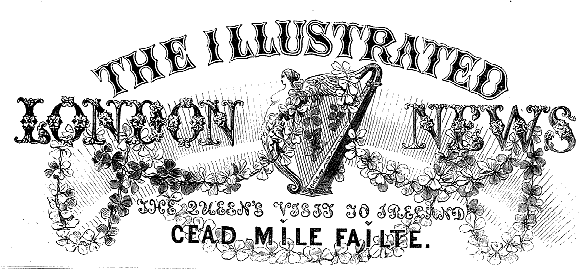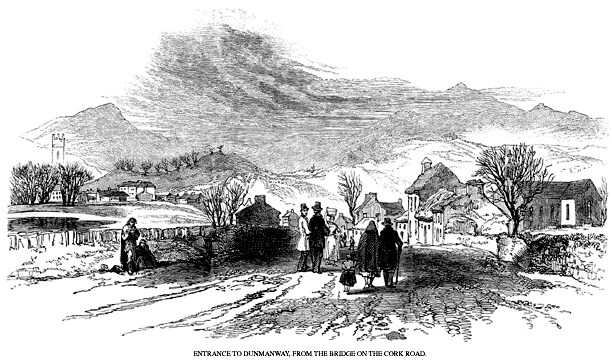
| [Feb. 20, 1847. |
![]()
SKETCHES IN THE WEST OF IRELAND.
-- BY MR. JAMES MAHONY.
 |

|
We resume from our Journal of last week our Artist's Sketches of Scenes and Incidents form the distressed district of Skibbereen, and its neighbourhood; premising that our main object in the publication of this Series of Illustrations is to direct public sympathy to the suffering poor of these localities, a result that must, inevitably, follow the right appreciation of their extent and severity.
We left our Artist, last week, on the road to Dromdaleague, to inquire into the horrible circumstances of Leahey's death.
The first Sketch is taken on the road, at Cahera, of a famished boy and girl turning up the ground to seek for a potato to appease their hunger. "Not far from the spot where I made this sketch," says Mr. M., "and less than fifty perches from the high road, is another of the many sepulchres above ground, where six dead bodies had lain for twelve days, without the least chance of interment, owing to their being so far from the town. After leaving this fearful spot, we soon reached Dromdaleague, where I called upon the Rev. J. Creedon, and inquired of him as to the fate of Leahey. 'Not only do I know the statement to be true,' replied the reverend gentleman, 'but I also prepared the man for death, and am ready to accompany you to the spot.' We, accordingly, started; and, within half an hour's drive, reached the village of Meinies, where the house of Leahey is situated, and of which I send you a sketch. Whilst making this, I learned from Mr.. Creedon, and one of the villagers, that not only was the account of Leahey's house in the Diary true, but the case was even more disgusting than there stated; and, horrifying as it was, the man's mother, who found the dogs about him, after having first lain him across the few remaining sparks of fire upon the floor, went out to beg as much as would purchase a coffin to bury him in."

"Having heard much of the wants of Dunmanway, I proceeded thither, and am delighted to say that this large and thriving town (of which I send you a sketch, taken from the bridge on the Cork road) seems to be the barrier to the dreadful want further west. Not, at the same time, but that much want does exist here, though nothing beyond what may be expected upon land where nature is not bountiful. The worst feature presenting itself, at this moment, all through the West, is the entire abandonment of agricultural occupation; and, during my entire excursion from Clonakilty round to Dunmanway, not more than ten or a dozen fields seemed to have been prepared for the spring; and the answer of all those to whom I addressed myself on the subject was, that if they put down, they did not know who would reap; and that, in case the crops were sown, the poor famished wretches would be there to eat them up long before they had time to grow.
"Again, all sympathy between the living and the dead seems completely out of the question; and the revolting practice will, doubtless, go on until it works its own remedy. I certainly saw from 150 to 180 funerals of victims to the want of food, the whole number attended by not more than 50 persons; and so hardened are the men regularly employed in the removal of the dead from the workhouse, that I saw one of them, with four coffins in a car, driving to the churchyard, sitting upon one of the said coffins, and smoking with much apparent enjoyment. The people also say that whoever escapes the fever is sure of falling sick on the road (the Public Works), as they are, in many instances, compelled to walk from three to six miles, and sometimes a greater distance, to work, and back again in the evening, without partaking of a morsel of food. Added to this, they are, in a great number of instances, standing in bogs and wet places, which so affects them, that many of the poor fellows have been known to drop down at their work."
 We must here revert to Ballydehob, on the Skibbereen road, which our Artist has
sketched, showing Mount Gabriel in the distance. Here he was told by the Rev.
Mr. Triphook that the destitution was of so frightful a nature that such persons
as could command five pounds were leaving the town, to avoid the contagion of
fever, as well as the afflicting scene of persons dropping around them daily;
and the informant added that the town was more than five times fuller of people
from the surrounding country than it had accommodation for.
We must here revert to Ballydehob, on the Skibbereen road, which our Artist has
sketched, showing Mount Gabriel in the distance. Here he was told by the Rev.
Mr. Triphook that the destitution was of so frightful a nature that such persons
as could command five pounds were leaving the town, to avoid the contagion of
fever, as well as the afflicting scene of persons dropping around them daily;
and the informant added that the town was more than five times fuller of people
from the surrounding country than it had accommodation for.
A specimen of the in-door horrors of Scull may be seen in the annexed sketch of the hut of a poor man named Mullins, who lay dying in a corner upon a heap of straw, supplied by the Relief Committee, whilst his three wretched children crouched over a few embers of turf, as if to raise the last remaining spark of life. This poor man, it appears, had buried his wife some five days previously, and was, in all probability, on the eve of joining her, when he was found out by the untiring efforts of the Vicar, who, for a few short days, saved him from that which no kindness could ultimately avert. Our Artist us assures that the dimensions of the hut do not exceed ten feet square; adding that, to make the sketch, he was compelled to stand up to his ankles in the dirt and filth upon the floor.
"I have thus," observes Mr. M., "been lengthy in my details in order that you may be as well informed upon the subject as I can enable you to be; and, bearing in mind the horrifying scenes that I have just witnessed, I entreat you to do the best you can for so much suffering humanity; as this visit to the West will, I trust, assist in making this affliction known to the charitable public."

![]()